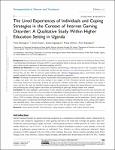| dc.identifier.citation | Nalwoga, V., Kizito, S., Kigongo, E., Atwine, P., & Kabunga, A. (2024). The Lived Experiences of Individuals and Coping Strategies in the Context of Internet Gaming Disorder: A Qualitative Study Within Higher Education Setting in Uganda. Neuropsychiatric Disease and Treatment, 823-834. | en_US |
| dc.description.abstract | Background: Internet Gaming Disorder (IGD), recognized as a mental disorder in both the Diagnostic and Statistical Manual (DSM5) and International Classification of Diseases (ICD-11), poses significant threats to physical, social, and mental well-being. This study
aims to delve into the experiences of individuals grappling with IGD.
Methods and Materials: The study employed an interpretive phenomenology, conducting interviews with 10 graduate students at
Makerere University. Participants were purposefully sampled until data saturation was achieved during interviews, which took place
between May and July 2023. An interview guide facilitated data collection (Supplementary File 1), and thematic analysis was
manually applied for data interpretation, utilizing intuition and imaginative approaches.
Results: The findings revealed that the majority of participants started gaming during childhood, starting with offline games. Exposure
to gadgets and games, idle time, and stress emerged as key triggers for IGD. Participants reported experiencing sleep deficits,
deteriorating interpersonal relationships, declining job performance, unhealthy eating habits, academic challenges, and wastage of
money and time. The study also identified strategies employed by participants to mitigate their gaming behaviors, such as refraining
from purchasing data, seeking support from friends, and uninstalling the game app, although relapses were common.
Conclusion: The study highlights a global pattern of early initiation into gaming, emphasizing the need for early intervention and
preventive measures. Factors such as easy accessibility and affordability of gaming platforms, idleness, and stress play significant roles
in motivating internet gaming, contributing to a higher prevalence among the studied population. The research underscores the adverse
effects of IGD on students, affecting academic performance, interpersonal relationships, and job performance. Notably, participants
demonstrate agency in addressing IGD through practical coping strategies, including controlling data access, seeking social support,
and uninstalling games. These coping mechanisms provide valuable insights into the complex nature of addressing IGD and form
a basis for developing targeted interventions and support systems within the higher education setting in Uganda.
Keywords: internet gaming disorder, lived experiences, coping strategies, qualitative study, higher education setting | en_US |

